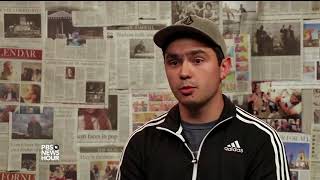(单词翻译:单击)
Judy Woodruff: Finally tonight, there is a national movement in schools to teach media literacy skills to teenagers who are growing up with access to more information than any previous generation. In an era of marked by calls of fake news and declining trust in media, we turned to our Student Reporting Labs to learn more about out how young people experience news and how they think about journalism.
Courtney Smith: You don't really know what you can believe, because there are so many sources saying so many different things.
Camden Miller: It's weakening trust between the media and the audience.
Tristan Eddings: I'm pretty sure that I have shared fake news, but I didn't realize it until someone corrected me.
Julia Joy: No one knows what to trust and what not to trust anymore.
Hector Machucha: I shared a couple stories back in — during the presidential election that might not be as true as I originally believed they were.
Jennifer Anyaegbu: We're having a problem of people actually believing it, and then going forward with that news to have riots and things like that.
Mary Williams: I believe that it's the new epidemic, because people don't understand how fast fake news spreads.

Muna Ezbudiwe: I remember there was a time everybody thought were in a gas crisis because of Hurricane Harvey, and everybody thought gas was running out. So, it spread through our social media and everybody got in a panic.
Addison Tusten: I don't necessarily think fake news is a problem so much as misinformation. People often are keen to take whatever information they're given right off the bat, sometimes without kind of thinking about where it's coming from or what it implies.
Angel Rivera: It is a person's first instinct to believe that what they see is true automatically. And people need to just double-check that, make sure they're getting the information from reliable sources.
Ushni Gupta: Journalism definitely does matter. It is the purest form of communication between people the politics and global issues.
Henry Smith: We live in a democracy, where the people make decisions about government. To make those decisions, we need information. And without journalism, where are we going to get it from? Twitter?
Trinity Aberin: We need to incorporate a type of lesson plan to improve our digital literacy skills.
Zoe Greenwald: We spend more time in the media than any generation ever has. And with all of this information being circulated, we need to make sure that the information that's getting to the audience is factual and is correct.
Judy Woodruff: So important that these young people learn these lessons. PBS NewsHour education coverage is part of American Graduate: Let's Make it Happen, a public media initiative made possible by the Corporation for Public Broadcasting.


